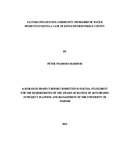| dc.description.abstract | The purpose of the study was to investigate the factors influencing community ownership
of water projects in Kenya with a focus in Kinna division, Isiolo County. The Government
of Kenya and Non Governmental Organizations have implemented many projects aimed at
addressing the water crisis in Arid and Semi arid areas; however most of these projects
have been characterized with low level of Sustainability. In Kenya most water projects
have performed dismally and most becoming un-operational and requiring rehabilitation.
This is due to low level of community ownership of these water projects. The study was
guided by four objectives, namely; to examine the extent to which community participation
influences community ownership of water projects, to assess the influence of community
training on community ownership of water projects, to determine the influence of
technology used in extraction of water on community ownership of water projects and to
establish the influence of distance between the user and the water point on community
ownership of water projects. The study was guided by community participation theory.
The study employed a descriptive survey research design. By employing this study design,
quantitative data was collected from 370 respondents who were community members and
qualitative data was obtained from members of water management committees and the
district water officer who was the Key informant. Simple random sampling technique was
used to identify the 370 respondents and through purposive sampling, the study involved 6
members of the water management committee in the 16 water supply projects. Data was
collected using well structured questionnaires and through focus group discussion. The
data was cleaned, edited and coded. Quantitative analysis was done using statistical
packages (SPSS V.21) and qualitative data was analyzed thematically and the findings
were then presented. The study found that all the independent variables were significantly
influencing community ownership of water projects. Community participation, community
training, technology used to extract water and distance between the user and the water
point influences community ownership of water projects. From the findings, the study
recommends that the Isiolo County Government and stakeholders allocates funding
towards the development of water infrastructure especially in construction of new pipeline
extensions and constructing of new water points in Kinna division. The use of solar energy
as an option to replace the diesel generators or a hybrid system should be explored. The
study also recommends that more local technicians are trained on operation and
maintenance of generators and hand pumps. The water management committees should be
trained on financial management and record keeping by the Ministry of Environment,
Water and Natural resources. When water management committee are being formed and
registered, participation and membership of women should be encouraged to avoid gender
discrepancy. The researcher recommends further studies on factors influencing community
ownership of water projects in other regions so as to allow for generalization of factors
influencing community ownership of water projects in Kenya. Further studies should be
conducted on the influence of social cultural on long term sustainability of water projects.
Especially age, gender and education levels of members of water management committees | en_US |

